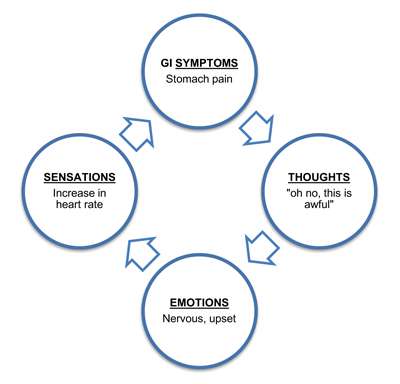GI Health Psychology
Find Your Care
Our team delivers holistic care for people with GI disorders. We enhance your overall well-being with a wide range of dietary, behavioral and integrative health practices. Call us at 310-825-2631 to connect with an expert.
Gastrointestinal (GI) health psychology is part of the Walter and Shirley Wang Center for Integrative Digestive Health. Our center offers consultation and behavioral treatment options for individuals with a range of digestive conditions.
Why GI health psychology?
Living with chronic and unpredictable digestive symptoms can affect daily life. Digestive issues can increase stress levels and interfere with meaningful activities that support wellness. Many patients also experience a range of emotions that are associated with their digestive condition.
GI health psychology recognizes the challenges that patients with digestive issues may experience. Unlike traditional psychotherapy, GI health psychology focuses on enhancing psychological resources to optimize digestive wellness and strengthen resilience to stress. Our GI health psychologists are specialized in the use of behavioral treatments that influence the brain-gut connection to reduce symptom severity and enhance quality of life. This whole-person approach embraces the interconnected relationship between digestive and emotional health.
What role does GI health psychology have in the brain-gut connection?

The brain and gut are in constant communication. The brain has a major role in supporting healthy digestive functions. There are a number of factors that could interrupt brain-gut communication pathways, which may affect the experience of symptoms. Several of these factors can be addressed with GI health psychology.
Stress or intense emotions can interfere with digestion and aggravate symptoms. In addition, the experience of GI symptoms can result in a pattern of distressing thoughts and emotions that worsen stress and increase bothersome symptoms. An example of the interactive relationship between symptoms, thoughts, emotions, and stress sensations is illustrated in the figure below. By identifying your modifiable factors that influence the brain-gut connection, GI health psychology can help develop a personalized treatment plan that is specific to your needs.
Will my gastroenterologist be involved in my care?
GI health psychology works closely with your gastroenterologist as part of an integrative team approach to gastroenterology. GI health psychology is a supportive treatment and does not replace your medical care plan with your gastroenterologist. Our goal is to provide the necessary tools and resources to enrich whole-person wellness. The GI health psychologists works together with our gastroenterologists, dietitians, and integrative health practitioner to treat your GI symptoms, optimize digestive health, and improve overall well-being.
What occurs in the initial consultation?
Our GI health psychologists will meet with you to learn more about your specific needs that are associated with your digestive condition. The consultation will assess the influence of your symptoms on stress and emotional well-being; identify challenges with managing symptoms; and address any changes in your quality of life that you may have experienced. You will be asked to complete brief questionnaires as part of the consultation process.
The consultation will help determine if GI health psychology is appropriate for your specific needs and will offer clinical recommendations and resources to support well-being. Our GI health psychologists will guide you in establishing treatment goals and will discuss your care plan with your gastroenterologist as part of our team approach.
What is the structure of GI health psychology?
GI health psychology is a short-term, skills-based treatment. It is beneficial for patients who are interested in a proactive approach to better managing their symptoms and are willing to practice skills to support gut health in-between sessions. Although the number of sessions will vary for each patient, research has shown that brief interventions for symptom-specific problems can be effective within four sessions. The GI health psychologist will further discuss treatment planning in the initial consultation. Treatment plans may include group and/or individual care.
What types of treatments are available?
GI health psychology uses evidence-based treatments that are directed toward the brain-gut connection to improve symptom management, quality of life, and adaptive coping skills to reduce stress. Our GI health psychologists will work with you to determine which treatment approach would be the most appropriate for your specific goals and will communicate this with your gastroenterologist. An important aspect of GI health psychology is the role of practicing skills in-between sessions to maximize their effectiveness on the brain-gut connection.